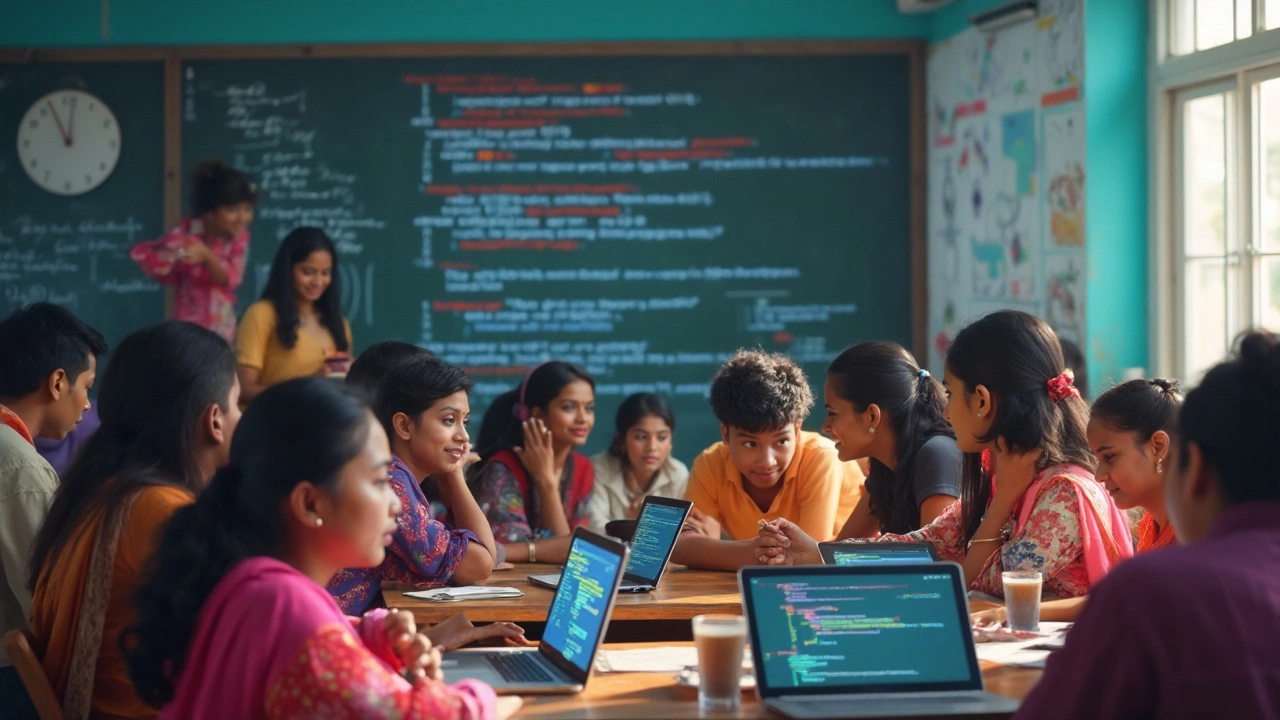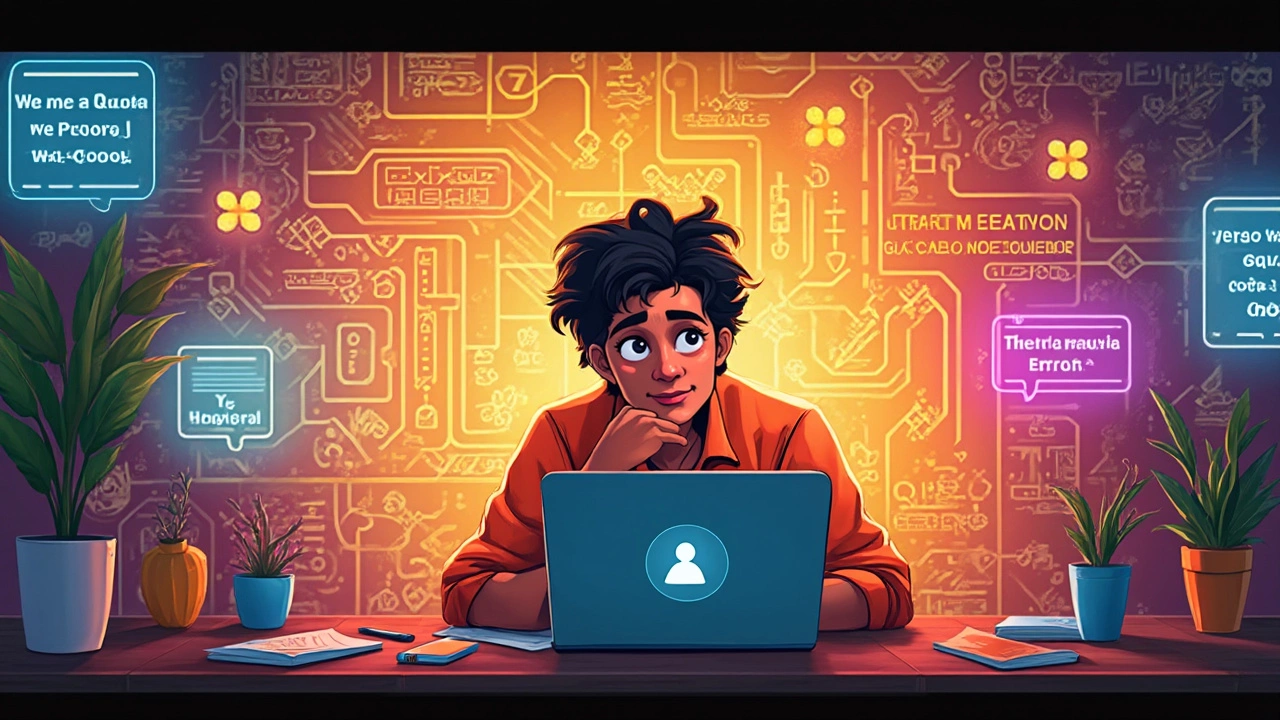Ever start something new and find it way harder than you thought it’d be? You’re not alone, especially when it comes to coding. Loads of folks kick off their coding journey pumped up but end up hitting a wall. What's the deal with that?
I’ve got kids, like Orla, who soak up tech like a sponge, but it’s not the same story for everyone. Often, it's the fear of complexity that's the first big hurdle. People look at lines of code and see gobbledygook. It’s intimidating! But guess what? Much of coding is logic, and that can be learned step by step.
Then there's the fact that coding can feel overwhelming. There are numerous languages, countless resources, and that's not counting the often confusing advice scattered across the web. Imagine trying to piece together a puzzle without the picture on the box.
But here's where things get interesting: tackling these challenges is not about being naturally good with computers. It's all about learning smart, not hard. Let's dig deeper into what holds people back, and how you can sidestep these coding potholes.
The Fear Factor
Diving into the world of coding can feel a bit like staring down a mountain. This fear, this intimidation, is often the first big wall people hit. Is it because they aren't smart enough? Nope, it's usually because the whole 'programming' thing seems so alien.
Think about it. The moment you see a screen full of symbols and words that don't look human, you might as well be reading hieroglyphics. Most people fear what they don't understand; that's just human nature. But here's the catch: this fear can actually be managed with the right mindset and approach.
One common fear is the myth that if you get stuck, it means you're not cut out for coding. And that's just not true. Coding is about problem-solving, not writing perfect code on the first try. Did you know that expert programmers spend a lot of their time debugging? It's a huge part of the job!
Another fact is, many people feel they need a background in math to succeed in coding. Reality check—while math is helpful, you don't need a degree in it to write *effective* code. Many coding languages, like Python, are designed to be more intuitive and user-friendly.
If you're feeling the fear, try dipping your toes in with some beginner-friendly platforms. Websites like Codecademy or freeCodeCamp can introduce you to fundamental concepts without overwhelming you. Starting small can ease that stress and build your confidence.
To wrap it up, the key to defeating the fear of coding is embracing a 'growth mindset.' It means knowing that even if you don't get it right away, you will with time and practice. So put on your explorer's hat and allow yourself to make mistakes. Each one is just a stepping stone to figuring out the coding puzzle.
Overwhelm and Complexity
Diving into coding often feels like standing at the bottom of Everest looking up. There's Python, JavaScript, HTML, and so many more. Each has its quirks, syntax, and uses. It's easy to get paralyzed just deciding where to start.
Here's the thing: trying to tackle too many programming languages at once is like learning three foreign languages simultaneously. Pick one that suits your immediate goals and stick to it till you’re comfortable. Starting with user-friendly languages like Python can ease your entry into the coding world.
"Learning to program is about understanding the thought process for solving a problem, not learning the syntax of a specific language," says renowned computer scientist Donald Knuth.
The real challenge is not the languages themselves, but the problem-solving mindset that coding requires. Many newbies dive into courses without clear goals. Define what you want to achieve—maybe develop a mobile app, create a personal website, or automate boring tasks. This helps narrow down what you need to learn and why, reducing the feeling of being overwhelmed.
Also, coding has its share of myths. One big misconception is that you have to be a math whiz. Sure, logic is key in coding, but basic math often suffices. Focus on grasping programming logic and concepts like loops, conditions, and variables. Once these are clear, applying them across different contexts becomes second nature.
Break your learning into small, manageable pieces. Tackle one concept at a time and write lots of mini-programs. This reinforces what you’ve learned and builds your confidence. Plus, connecting with online coding communities can be a lifesaver. Share your struggles, ask questions, and get feedback. Coding becomes less daunting when you know others are facing similar challenges.
Here's a quick look at a basic approach to learning code without feeling overwhelmed:
- Start with one language that aligns with your goals.
- Set small goals—build a simple project, then expand.
- Engage with communities for support and motivation.
- Use fun resources like games to learn coding concepts.
In summary, don't let complexity scare you. With a clear focus and a structured approach, coding can transition from chaotic to captivating.

Learning Myths and Mistakes
When it comes to learning coding, there’s a truckload of misconceptions floating around. A big one is the idea that you need to be some tech genius or math whiz to pick up coding. This couldn’t be further from the truth! Coding is more about problem-solving and logic than crunching numbers.
Many get stuck on the myth that there's a best programming language to start with. Spoiler: there isn’t. The language doesn’t matter as much as understanding programming concepts. Python, JavaScript, or Ruby are all great starting points, but choosing one depends on what you’re excited to build.
Another common blunder is trying to learn too much at once, which leads to burnout. Learners often fall into the trap of jumping from one tutorial to another without applying what they’ve learned. It’s like reading about swimming without ever jumping in the pool. Practice code daily—even small projects count.
Here are some of the mistakes newbies make:
- Not asking for help: This is huge. Some learners hesitate to seek help because they fear appearing clueless. Join coding forums or local groups. Community support is powerful.
- Ignoring fundamentals: Skipping foundational concepts in favor of trendy frameworks can lead to gaps in understanding.
- Over-reliance on tutorials: Following along with tutorials is good, but try creating something original to reinforce your skills.
Coding is a marathon, not a sprint. Keep your focus on consistent, incremental progress. You'll thank yourself later for sticking with it.
Practical Tips and Strategies
Getting good at coding doesn't happen overnight, but with some clever approaches, it gets a lot easier. Ready to turn those initial struggles into coding wins? Let's get into some practical ways to tackle those coding challenges head-on.
Start Simple: Dive into the shallow end before the deep. Instead of tackling a massive project, start with small exercises. Tools like Codecademy offer interactive lessons for beginners that introduce concepts step by step.
Practice, Practice, Practice: There’s no magic wand here. Coding is like a muscle you need to work out. Regular practice reinforces what you learn. Sites like LeetCode and HackerRank let you flex your coding skills with hands-on problems.
- Dedicate a set time each day to coding. Consistency is key.
- Use real-life projects that interest you. Build a simple website or create a basic app.
Break Down Problems: If you ever find yourself staring blankly at your screen, it’s time to simplify. Break down complex coding tasks into smaller, digestible pieces. Pseudo-code is a great way to organize your thoughts before diving into the actual coding.
Learn to Google Better: Strange as it sounds, becoming a pro at finding solutions online is a legit skill. Most of your questions have already been answered, thanks to communities like Stack Overflow. Learn to frame your questions precisely and use the right keywords.
Join Coding Communities: Don’t go it alone. Being part of a community like GitHub or Reddit's coding forums can provide support and motivation. You can even find a coding buddy for pair programming—two minds are better than one!
By following these strategies, conquering those pesky programming difficulties becomes a lot more attainable. It's all about taking small, manageable steps and learning from every bug you squash.



